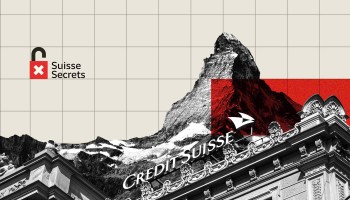Leonardo González Dellán's LinkedIn page promotes him as an entrepreneur and restaurateur. A U.S. Treasury Department sanctions notice calls him a testaferro, a financial front man hiding money for corrupt Venezuelan politicians. But to global giant Credit Suisse, he went by another name: client.
González was sanctioned by the U.S. government in 2019 for his alleged role in managing accounts through which bribes were paid to Venezuelan politicians as part of a corruption scheme worth $2.4 billion.
Well before he was sanctioned, González was a key player in the complicated bond-based parallel market that sprang out of Venezuela’s attempts at currency control in the early 2000s.
The system, centered around brokerage houses known as casas de bolsa, allowed investors to take advantage of the difference between two government-set rates of the Venezuelan bolivar and the black-market rate. Many earned billions of dollars that were moved out of Venezuela and into Swiss banks, condos in Miami, luxury yachts, and cars.
The so-called permuta market’s years of operation, between 2003 and 2010, became what some have dubbed the “savage years,” a nod toward the feeding frenzy it sparked among financial brokers — many of whom, like González Dellán, were clients of Credit Suisse.
But Credit Suisse’s involvement in Venezuela’s economic meltdown went even further than servicing corrupt elites. Back in the 1990s, one of the bank’s employees played a key role in creating the foundation for a system that, while technically legal, would be undermined by corruption.
Credit Suisse employee Francisco “Pancho” Illarramendi led a team at the bank to develop currency trading mechanisms that would later become instrumental to the permuta market. Years later, after he left the bank to set up his own hedge fund, Illarramendi would be convicted of running a massive fraud using that very market.
Amid the vast fortunes made by some, this frenzied period was marked by human rights violations and endemic corruption in Venezuela’s self-described socialist government.
Impunity reigned in Venezuela. And large Swiss banks, including Credit Suisse, welcomed Venezuelan clients with open arms. Venezuelans involved in the permuta market held fortunes at the lender worth at least 500 million Swiss francs, according to leaked banking data analyzed by journalists as part of the Suisse Secrets project.
The Suisse Secrets Investigation
Suisse Secrets is a collaborative journalism project based on leaked bank account data from Swiss banking giant Credit Suisse.
Among them are men accused of serious financial crimes: two named as co-conspirators in a $2.4-billion bribery scandal, two implicated in a $700-million Ponzi scheme, and others accused of stealing the identities of at least 1,000 of their compatriots.
A source with intimate knowledge of the bank’s operations in Venezuela during the early 2000s told OCCRP that such clients didn’t represent a problem for Credit Suisse. In fact, the source said, the lender actively pursued customers either known or suspected of being testaferros.
Credit Suisse declined to discuss individual clients or accounts. In a statement, it said it screens customers in line with industry standards to “identify and manage financial, regulatory and reputational risk, both at onboarding as well as in relation to existing accounts.”
Reporters talked to numerous Venezuelans with knowledge of the creative financial schemes that helped sink the country’s economy, either as participants or as scholars. Some were granted anonymity so they could tell their stories without risking retaliation from the regime of Nicolás Maduro.
‘Free Money While Doing Nothing’
Although the freewheeling permuta market is often seen as capitalism run amok, it was intimately linked to a socialist government that began making bad economic decisions almost as soon as President Hugo Chavez came to power in 1999.
After a series of strikes paralyzed the country, the Chavez government suspended private foreign currency trading in 2003 in an effort to prop up the bolivar and prevent capital flight. From that point on, to acquire U.S. dollars — which many saw as the safest way to preserve wealth — Venezuelans had to apply through a government body, the Commission for the Administration of Foreign Currency. It set an official rate that grossly overvalued the bolivar against the dollar.
A parallel black market in dollars quickly sprang up. But so did an unusual third market, known as the permuta, or “swap” market, which took advantage of a loophole: While buying U.S. dollars on the free market was illegal, selling stocks and bonds abroad in exchange for dollars was not.
Venezuelans could go to brokerage houses, known as casas de bolsa, and buy government bonds in bolivars. The brokerage would then use an offshore company to swap these with another broker for dollar-denominated bonds, at times obtained from the government using a fixed, artificially low official rate. Buying and selling stocks or bonds at different rates, a financial practice known as ‘arbitrage’, allowed brokers to earn astronomical sums.
“It created the perfect arbitrage opportunity, something that during my PhD, they told me 100 times does not exist,” said a prominent Venezuelan economist, who spoke on condition of anonymity for fear of retribution from the government.
The economist told OCCRP that if the total value of government bonds issued between 2003 and 2010 was around $70 billion, intermediaries like the casas de bolsa would have earned around $10-12 billion.
“It was a way to get free money while doing nothing,” he said of the permuta feeding frenzy.
Meanwhile, because so many of the permuta swaps involved transactions taking place offshore that were difficult to regulate — and because the market was difficult to understand — it attracted unscrupulous actors. Bribery and insider trading soon became the only way to operate within the permuta system, which “degenerated into a mechanism of systemic corruption,” according to Orlando Ochoa, a Venezuelan economist.
This corruption went straight to the top. Two consecutive National Treasurers accepted huge bribes from casas de bolsa for the right to conduct lucrative swaps of bolivar-denominated bonds in exchange for U.S. dollars at the government-set rate.
Starting around 2007, Venezuela’s government also fueled the permuta system by issuing its own debt in the form of “structured notes” — high-risk bolivar-denominated bonds that could be exchanged for dollar-denominated Venezuelan debt traded internationally. These, too, could be used for arbitrage. Venezuelan banks also sold these structured notes to international banks like Credit Suisse, which, in turn, sold them on to investors.
According to a report by the University of Pennsylvania, the government tolerated the permuta market for so long because demand for dollars was so much higher than it could ever meet with the U.S. currency it released into the official market. In an economy largely driven by selling oil for export and importing consumer goods with the proceeds, a lack of foreign currency could severely curtail consumers’ buying power.
But the permuta system became so dominant that it undermined the government’s currency and inflation controls. By 2010, the Chavez government turned on the brokerage industry, raiding many of the casas de bolsa. Some of the owners were placed on trial and even jailed, while others escaped the country, having safely squirreled money away in Switzerland and other secrecy havens.
The Castillo Bozo Brothers
Venezuelan brothers Leopoldo and Gabriel Castillo Bozo were at the heart of a massive securities fraud scandal in 2009. They were also clients of Credit Suisse.
Around this time, Venezuela’s economy also started to go into a long-overdue free fall. Oil exports had peaked in 2007 and would fall by 71 percent over the next decade, while inflation began to rise. Even though buying foreign currency was technically illegal, anyone who kept money in bolivars was sure to have their savings wiped out, creating an even greater incentive to patronize the permuta brokerages.
“At the time, and even today, everyone in Venezuela is trying to protect their money, to have it in dollars,” said Marianella Perez-Majul de González. Together with her elderly mother, uncle, and two sisters, she said her family invested at least $300,000 in bonds sold by ABA Mercado de Capitales, a Maracaibo-based casa de bolsa.
The bonds offered a good return of between 4 and 7 percent, but the real draw was that they were denominated in dollars. The family was also attracted by the reputation of three ABA directors — Enrique Auvert Vetencourt, Bernardo Belloso, and Juan Carlos Abudei — who came from some of the leading families in oil-rich Zulia state.
Then, in 2010, the government seized ABA and later charged its executives with fraud. A number of competing brokerage houses were seized or liquidated around the same time. Perez-Majul’s family and others found themselves unable to withdraw their investments. According to Venezuela's justice ministry, around 300 clients saw over $50 million disappear into the brokerage.
“My mother is 91 years old and she lived on that income, she had her money there [and] supported herself on the interest,” said Perez-Majul.
Auvert, Abudei, and Belloso, it turns out, jointly held four accounts at Credit Suisse during their brokerage’s boom years, from 2007 to 2009, worth at least 1.9 million Swiss francs.
They weren’t alone: the leaked data also turned up multiple accounts linked to eight other top financial brokerages in Venezuela during this period, including one that collapsed in the wake of a $700-million Ponzi scheme. According to the former head of one leading casa de bolsa, brokerages preferred Swiss banks for stashing away the proceeds of high-value transactions.
“Swiss banks are for safekeeping money,” he said. “Normally the money that people do not want others to see.”
Reached in Miami, where he now lives after fleeing Venezuela, Auvert confirmed that the ABA partners did hold a Swiss bank account together, but said he was unsure of how many since his memory of those years was foggy."
The ex-banker, who now works as a car salesman, said he couldn’t remember exactly why the account was established, but he believed it was at the behest of customers trying to get their money out of Venezuela.
“The big fear wasn’t what was happening in ABA, it was what was happening in the Venezuelan financial sector,” Auvert said. “It is perfectly normal for people to get their money abroad [and out of Venezuela].”
Friends in High Places
Leonardo González Dellán has long been someone who in banking circles would be considered a PEP, or “politically exposed person”: a client who represents a high risk of corruption and illicit dealings due to his or her influence or a prominent public role.
His father, Eudoro González, was a senator, while his brother is now a member of the Venezuelan legislature. It was at Banco Industrial de Venezuela, one of the country’s oldest and largest state-owned banks, that González Dellán made his own name as a banker, rising through the ranks until he became the bank’s president in 2002.
When he left Banco Industrial in 2004, González Dellán became a director of the largest Venezuelan casa de bolsa at the time , Econoinvest Capital, his name lending the firm greater legitimacy. On his author bio page for the web publication New Europe, González Dellán credits himself with helping “to grow the country’s phenomenally successful brokerage industry in the late 2000’s.”
He soon became a very wealthy man. He opened one of the top restaurants in Caracas, moved to London, and married a famous Italian-Venezuelan model in Las Vegas.
He was also deeply involved in a billion-dollar corruption scheme that involved funneling massive bribes to Venezuelan state treasurer Alejandro Andrade in exchange for the right to conduct lucrative bolivar-to-dollar swaps with the government.
Even as he was allegedly bribing the treasurer, the U.S. government said he was also helping him hide his dirty money offshore. In a 2019 announcement of sanctions against González Dellán, the Treasury Department said he acted as a front man for Andrade and other military and political figures, helping them hold ill-gotten gains in offshore accounts and using them to buy properties, aircraft, horses and luxury assets. The Treasury Department said his conspiracy with Andrade lasted a decade, from 2007 to 2017.
Almost that entire time, according to the leaked Suisse Secrets data, González Dellán was a Credit Suisse client. The leaked data shows that he opened a Swiss account in June 2007 and quickly moved 8.3 million Swiss francs into it, which closed in November 2008. He opened another account in June 2011, and within two years it held almost 11 million Swiss francs. It was open until October 2015.
His name is also on an unusual mega-account, opened in June 2007, owned by more than 30 legal entities — including many casas de bolsa — and 10 individuals, some of them prosecuted in the United States or Venezuela. They include:
Luis Alberto Benshimol Chonchol, whose Bencorp Casa de Bolsa C.A., which also appears on the account, was seized in Venezuela in 2010.
Martin Lustgarten, an infamous Venezuelan currency broker who caught a break when a technical misstep by U.S. prosecutors allowed him to escape a money laundering trial.
Cedel International Investments, a firm belonging to banker Eligio Cedeño, a former political prisoner of the Chavez regime. Cedeño told OCCRP that the account was opened without his knowledge while he was in jail.
It’s not clear what this account was used for, but it may have involved the permuta system. Cedeño said it was likely opened for “business purposes,” but didn’t go into detail.
Andrade cut a plea deal in 2017 and admitted to receiving more than $1 billion in cash bribes from numerous people, including González Dellán, as well as private jets, yachts, cars, homes, racehorses, and high-end watches.
Another alleged co-conspirator, Rafael Eduardo Cedeño Wolkmar, also appears in the Suisse Secrets leak, linked to yet another Swiss account that contained 18.7 million Swiss francs (around $20 million) at its peak in September 2012. The account was open during the same period Andrade admitted to transferring dirty money into Swiss accounts, including one fronted by Cedeño at PKB Private Bank.
The Exchange Whisperer
Credit Suisse even had a seat at the table during the creation of the parallel market that would eventually help sink the oil-rich South American nation’s economy, thanks to a bright Venezuelan with a mathematical mind named Francisco “Pancho” Illarramendi.
Between 1994 and 2004, Illarramendi led a team at Credit Suisse in developing currency arbitrage mechanisms that, according to his lawyers, would later “set the standard” for cross-currency transactions across the permuta market. Taking a leave of absence in 2004 to work as financial adviser to the state-owned oil company Petróleos de Venezuela, S.A., or PDVSA, he advised the Chavez government to begin issuing state bonds denominated in dollars — another vital aspect of this system.
Illarramendi later set up hedge funds for wealthy investors, but ran afoul of U.S. law enforcement, which accused him of orchestrating a $700-million Ponzi scheme through the very same offshore currency-exchange system he’d helped create.
In court documents, Illarramendi’s lawyers argued he’d been misunderstood — but also noted that Credit Suisse had “played a deep pocket role in the purchase of Venezuelan securities” in Illarramendi’s scheme. His lawyers claimed that financial instruments issued by the bank to dump Venezuelan government debt, called “credit linked notes,” were used by Illarramendi and a co-conspirator. As a former employee, Illarramendi allegedly had a special arrangement for obtaining these notes to use at his hedge funds.
Credit Suisse did not respond to questions on Illarramendi or its role in issuing credit-linked notes. The bank was never investigated for any role in the trade.
Illarramendi was convicted on lesser counts, sentenced to 13 years in prison and is now in a Maryland halfway house pending full release scheduled for 2024. He did not respond to questions sent to him via prison authorities and family members.
While Illarramendi’s conviction was a victory for prosecutors, it has so far proven impossible to retrieve all the proceeds of his scam.
John J. Carney is the U.S. receiver tasked with recovering Illarramendi money for investors. Two of the subjects of Carney’s investigation were found in the leaked Credit Suisse data.
Carney launched civil proceedings in 2013 against Piero Montelli Torres, a key player in the scheme, but abruptly dropped them the following year. Carney’s representative told OCCRP the decision was based on “the expected costs of litigation, the likelihood of success, and his ultimate ability to enforce a judgment, particularly on assets that may be located in foreign jurisdictions.”
Montelli was part owner of a Caracas-based brokerage called Inverplus Sociedad de Corretaje de Títulos Valores. He allegedly received more than $447 million in payments, equivalent to 64 percent of the total value of the Illarramendi scheme. Over half of this money allegedly passed directly through Inverplus.
Montelli didn’t respond to a request for comment.
Montelli and a second Inverplus executive held a corporate account at Credit Suisse valued at 8 million Swiss francs in June 2010. The account was closed just one month before Carney launched recovery proceedings against him.
Armando “Baldy” Capriles Capriles was described in a separate case against a different alleged conspirator as “having knowledge” of transactions worth several million dollars conducted between offshore companies and entities controlled by Illarramendi.
In January 2010, according to court documents, Illarramendi transferred $1.8 million to the brokerage Multiplicas Casa de Bolsa. The leaked banking data shows that Capriles and his wife were named as co-holders of a Multiplicas account at Credit Suisse at that time. It was worth 136 million Swiss francs in 2007 and was closed in 2015.
Capriles’s wife did not respond to questions. Capriles told OCCRP he was a victim of Illarramendi ’s scheme and never had a formal relationship with Multiplicas Casa de Bolsa, adding: “I certainly did not profit one cent from that situation.”
Two years after he was mentioned in the case, Capriles opened a Credit Suisse account, which held 146 million Swiss francs in 2016.
Through separate proceedings against other conspirators, Carney has managed to recover around $456 million in total assets, approximately two-thirds of the total amount stolen, his representative said. It’s unclear if the other third will ever be tracked down.
Looking back at the wild years when the permuta market was in full swing, the Venezuelan economist said ordinary Venezuelans would spend years paying the price of the decision to hand brokerage houses so much power.
“Why did they generate such huge opportunities for just a few people?” he asked.











